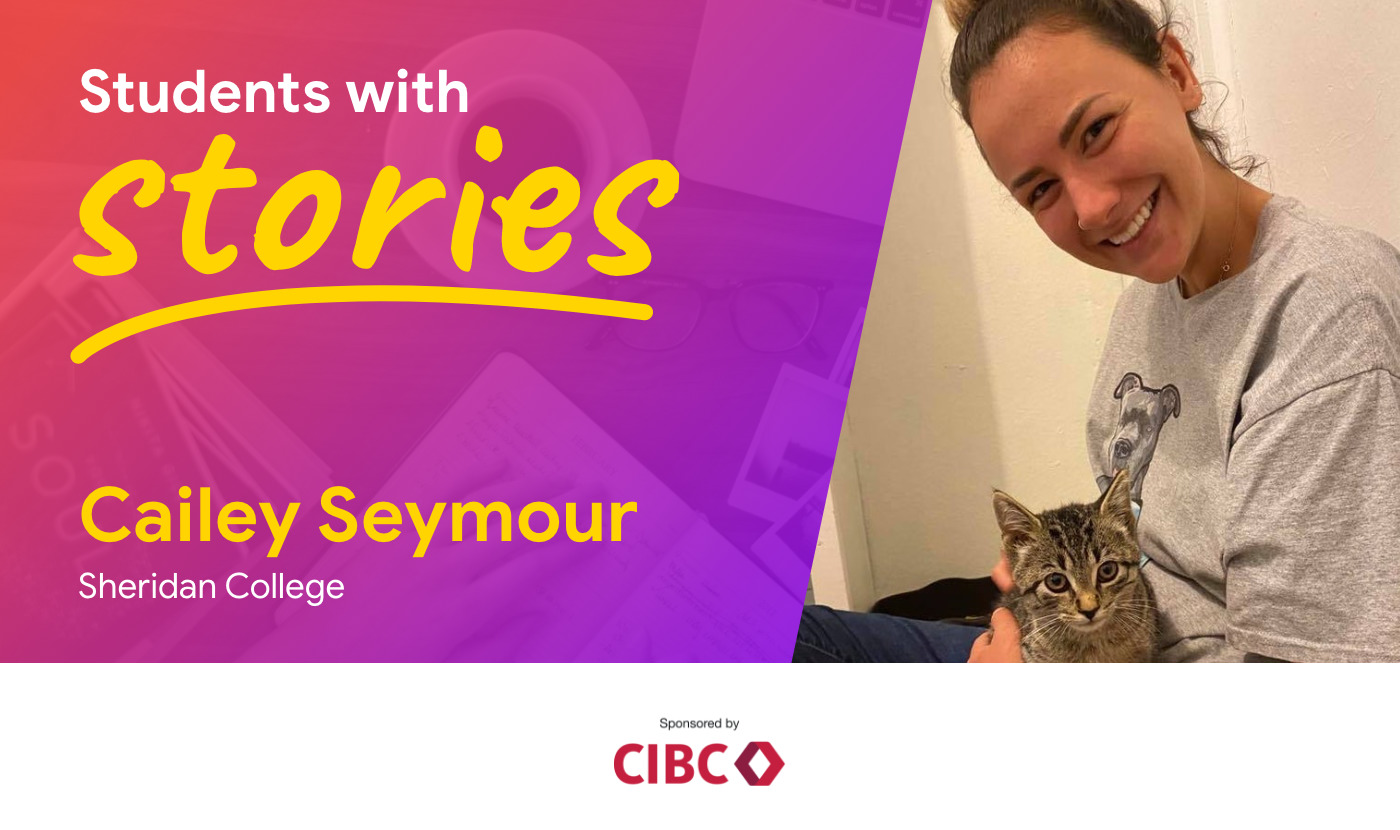Since the start of COVID-19, Cailey Seymour from Sheridan College has been using her knowledge as a Veterinary Technician to rescue some of the furriest of friends. The trouble is, she can’t do it alone. Unfortunately, many of the rescued kittens face ongoing health challenges which can cost up to thousands in vet bills.
Here’s what Cailey had to say about starting her rescue during a global pandemic, and her drive to keep helping even when things get hard (and expensive).
Can you tell us a little bit about yourself?
I have a huge passion for rescuing animals and educating the public on animal care. In fact, I’m aiming to soon complete a certificate program in non-profit and voluntary sector management to broaden my knowledge on running a successful organization. I started rescuing animals at a very young age, always caring for orphaned wildlife and helping out with feral kittens in my community. I have worked with several animal welfare organizations including Game Rangers International – Elephant Orphanage Project, the Guelph Humane Society, VIDA Volunteer – Veterinary Assistant Guatemala, Woodlands Wildlife Sanctuary, and of course now Dorset Rescue Kittens.
I have personally fostered over 100 kittens, a hedgehog, a ball python, a dog, and a chick and have had many pets of my own, now including a rescue dog, two free-roam house rabbits, and whichever kittens and rescued ducks/chickens we are fostering at the time.
Can you expand a bit on what you do and your inspiration behind it?
“These animals need me and I am their best chance at survival. 75% of feral cats don’t live until the age of two.”
I founded Dorset Rescue Kittens, an incorporated not-for-profit, in June of 2020 while working as a wildlife care attendant full-time on my summer break. I had started taking in kittens born outdoors in our community and I needed to start fundraising for medical bills and find the kittens’ homes so I started a Facebook page and the rescue grew from there. From June of 2020 – December of 2020, I rescued and adopted out 50 cats while working or studying full-time. In 2021, I have already rescued well over 50 cats and anticipate rescuing over 100 throughout this year. I grew up cottaging in the small town of Dorset, Ontario where there is a small population of incredible people and a huge population of feral cats in need.
I rescue cats primarily from Dorset, Minden, and Haliburton. A feral cat is defined as an un-owned domestic cat that lives outdoors and avoids human contact. Because these cats are un-owned, they have not been sterilized and therefore continue breeding and growing in population. They are commonly overlooked as they are not friendly with people and can be a nuisance when there are too many of them in an area. Unlike dogs, most areas have no bylaws against roaming cats, therefore, not many people worry when they see a cat wandering. But, I do.
I have dedicated my spare time and all of my energy and resources to helping these cats and giving them the best life possible. This generally means rescuing the kittens, finding them a loving foster home to socialize them, getting them vetted which includes spay/neuter, deworming, flea treatment, vaccines, and a microchip, and then adopting them out. We have a trap-neuter-vaccinate-return project where we live-trap the adult ferals, get them vetted and return them to their colony, where they are happiest. This stops the breeding cycle for that cat and also helps them live a longer and happier life.
In some situations, we are able to socialize the adult ferals, especially if they are young or when we have a nursing mama cat who needs to stay in foster care. When they are able to socialize, we find patient and understanding adoptive homes. The whole process for a cat from the time I rescue them, to the time I adopt them out, can take anywhere from 2 weeks to 6 months or longer depending on their behavioral and medical needs.
I absolutely love what I do and wish I had even more time to do it. These animals need me and I am their best chance at survival. 75% of feral cats don’t live until the age of two. They are faced with so many dangers such as predators, food and shelter security, getting hit by cars, disease, and much more. There is nothing more beautiful than rescuing a sick, in-need cat/kitten and watching them blossom into a healthy and happy companion and finding them an incredible home.
In your opinion or experience, in what ways do you feel animals can help those feeling isolated or anxious right now?
Animals offer so much comfort for those feeling isolated, anxious or alone. Not everyone is in the right position to give an animal a forever home, however, rescues are always looking for foster homes which is a great opportunity for students, seniors or those who cannot offer permanent support.
What are you currently working towards, and why do you feel it’s particularly important given our current circumstances with the pandemic?
I’m working towards developing the rescue and educating the community on the feral cat problem we are facing. During the pandemic, there are lots of people who have more time on their hands and are looking for things to do and challenges to take on. Volunteering with or fostering for your local shelter or rescue is a great way to give back to the community. Your support could save an animal’s life! If you’re looking for ways to help outside of fostering and adopting, we always appreciate efforts to help spread awareness, monetary and supply donations.
What has been your biggest learning curve so far throughout your initiatives?
It’s been difficult to fundraise digitally and to reach out for help. The rescue primarily runs off of donations and each kitten costs at least 300$ in medical care and basic care supplies. We do have an adoption fee that covers the most basic care put into the animal however, most of the cats in our care require extra medical attention. It adds up. I also find it challenging to ask for help sometimes. Thankfully, I have several volunteers, fosters, and donors who help keep the rescue going and I look forward to growing the support team.
If you or someone you know is looking to adopt an animal, we’d love it if you’d consider rescuing from Cailey’s Dorset Kitten Rescue. Welcoming a furry roommate can offer emotional support and companionship during these times of isolation while reducing anxiety. If you’re not in a position to adopt or foster, you can donate here to help Cailey save these animals.

More great content for students
*Opinions expressed are those of the author, and not necessarily those of Student Life Network or their partners.

 Sponsored
Sponsored


